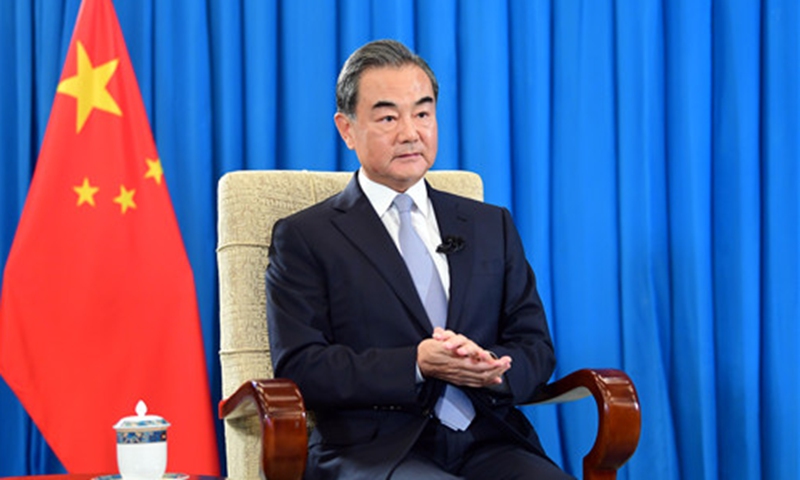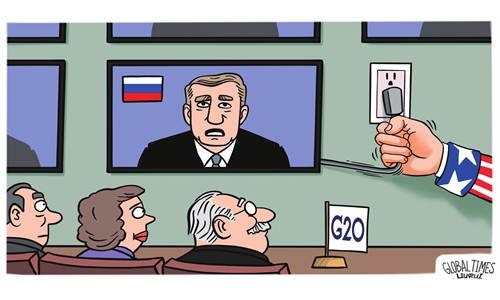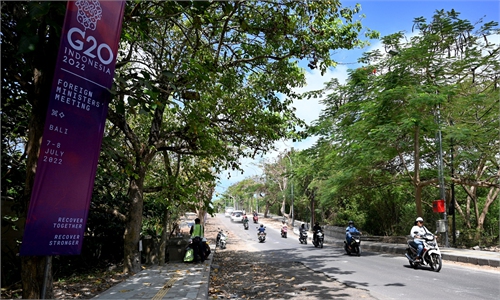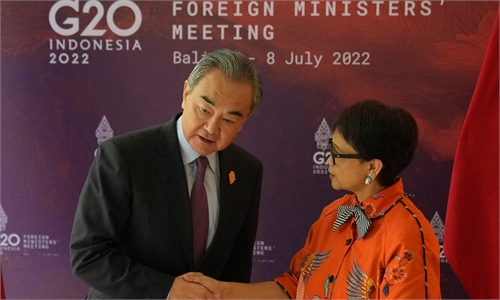Chinese FM lays out three points of concern on Ukraine crisis
Certain countries urged to drop Cold War mentality, stop double standards and unilateral sanctions

State Councilor and Foreign Minister Wang Yi
Chinese State Councilor and Foreign Minister Wang Yi laid out three points of concern for the Ukraine crisis during a meeting with India's foreign minister on Thursday, which was followed by a meeting with Russian diplomats during the ongoing G20 foreign ministers' meeting.
China opposes using the crisis to instigate a Cold War mentality, comparing the Ukraine crisis with the Taiwan question and China is against unilateral sanctions imposed on China and other countries using the crisis as an excuse, Wang said.
During a meeting with Indian External Affairs Minister Subrahmanyam Jaishankar on Thursday, Wang said that faced with an increasingly complex situation and its challenges, the world needs solidarity rather than division, and needs dialogue rather than confrontation. China opposes any act of instigating a Cold War mentality and confrontation, and it continues to firmly stand on the right side of history and on the side pushing for peaceful dialogue.
China also opposes double standards and any act that damages China's sovereignty and territorial integrity, Wang said. He noted that some countries emphasized the principle of sovereignty on the Ukraine question but constantly challenge China's sovereignty and the one-China principle on the Taiwan question, and this is clearly a double standard.
The Chinese senior diplomat said China opposes any intention of bringing the Ukraine crisis together with the Taiwan question and will safeguard China's core interests.
Some countries, by using the Ukraine crisis as an excuse, imposed unilateral sanctions on China and other countries, which was unfair and illegitimate, hurting normal interactions between countries and violating international trade rules, Wang said. Such moves also expanded the crisis and made it more complex, which is something all sides should reject.
"China's three points of concern clearly show that hegemony is not welcome in handling global affairs, and hegemony is also the essential reason for the prolonged conflict between Russia and Ukraine," a Beijing-based expert on international affairs who preferred not to be named told the Global Times on Thursday.
It also signals that the world needs more dialogue rather than the divisions created by the US to show its supremacy, as US hegemony is also the origin of a number of international crises and turmoil today, he said.
Unlike the US, which has sought to turn this year's G20 into a chance to isolate Russia, China, along with some emerging powers, has been looking into more opportunities for economic recovery amid the COVID pandemic and other concrete issues that could benefit both sides.
Against the backdrop of the US and its allies attempting to contain Russia and China, Russia and China will continue to increase the scope and practical interaction, Russian Foreign Minister Sergey Lavrov said during the meeting with Wang, TASS reported.
The position of Russia and China is gaining more support among other countries, in contrast to the openly aggressive policy of the West, which seeks to maintain its privileged position and dominance in global affairs, Lavrov said, noting that the Russian stance is gaining increasing support and appreciation among participants in international relations, according to the Russian media report.
The main aim of the US-led Western bloc at the G20 meeting is to further pressure Russia over the Ukraine crisis, as a US official was quoted as saying in a Reuters report on Thursday that "this week's G20 meeting in Bali cannot be business as usual but the US is determined to ensure nothing happens there that can give legitimacy to Russia's 'brutalizing' of Ukraine," after the US, Japan and Germany officials revealed that they would echo the US intention of adding to the pressure on Russia at the meeting.
Wang also met diplomats from Indonesia, Argentina and the EU on Thursday morning, Zhao Lijian, spokesperson of the Chinese Foreign Ministry, told a routine press conference on Thursday afternoon. "Wang is currently meeting with Lavrov, and will have bilateral meetings with those from the US, France, Germany, Spain, Netherlands, Canada, Australia, Singapore and Saudi Arabia later," Zhao said.
While Wang and US Secretary of State Antony Blinken are expected to meet at the G20 meeting, the US side is looking to discuss putting up guardrails on the China-US relationship so the competition between the two countries "does not spill over into miscalculation or confrontation," according to the website of the US Mission to ASEAN.
Zhao also told the press conference that the three joint communiqués serve as the guardrails of US-China relations, and the US side should abide by the provisions in the documents and the promises it has made to China. As the most consequential bilateral relationship in the world, China-US relations should improve rather than deteriorate, he said.
Some Chinese experts believed that Washington will use this issue to pressure Beijing over the Russia-Ukraine conflict instead of really trying to improve US-China relations, and turn this multilateral platform designed to discuss economic cooperation into an anti-Russia and anti-China alliance, creating a contrast with China's approach of seeking dialogue with more countries.
Washington's approach serves only its own interests, which will lead to more conflicts and divisions across the world, experts said.
Apparently, when Russia attends some international cooperation mechanisms now, it faces unprecedented boycotts by the West, and this containment against the backdrop of the Ukraine crisis aims to isolate Russia from the international system, Yang Jin, an expert at the Institute of Russian, Eastern European, and Central Asian Studies under the Chinese Academy of Social Sciences, told the Global Times on Thursday.
"But China treats the G20 as a platform for global economic issues and cooperation, and is unwilling to politicize it, as it also serves as a bridge of engagement between developed and developing countries," Yang said, noting that if the ongoing G20 becomes a platform for sanctioning Russia, it would deviate from its main and original purpose.
During a meeting with Indonesian foreign minister Retno Marsudi on Thursday, Wang said China is willing to work with developing countries including Indonesia to bring a collective voice against the Cold War mentality and bloc-driven confrontation, and to push reasonable, practical and constructive dialogue, Zhao said.
Unlike the US, which reportedly refuses to engage with Russia at the G20 meeting, China will meet a number of countries' diplomats including those from Australia and Canada - the two countries that have seen deteriorating bilateral relations with China in recent years due to their ill-intentioned policies of coordinating with the US in its China containment strategy.
Chinese experts said it also showed a major difference between China and the US in their foreign policies as China always advocates for multilateralism, and high-level engagements like the G20 could help increase understanding, boost consensus and control divergences.
According to a US official familiar with the matter, Blinken also plans to avoid appearing in any official group photos with his Russian counterpart, CNN said.
"China's engagement is clearly focused on stability and joint progress regionally and globally… As a major power, China needs to closely engage with developed countries on economic and security issues, which is necessary to expand consensus," the Beijing-based expert said.
For instance, China and India have agreed to follow the important common understandings reached by the two leaders and the agreements signed by both sides, and properly resolve issues related to the western sector of the China-India boundary in line with the principle of mutual and equal security, the Chinese Foreign Ministry spokesperson said.
"China and India are each other's important neighbors. The two sides have the will and capability of jointly maintaining peace and tranquility in the China-India border areas," he said.
G20 is not G7, so the US won't be able to achieve its goal of isolating Russia, some experts said. They noted that the majority of countries participating in the event are much more concerned about concrete issues such as the food crisis and economic recovery rather than taking sides between the US-led West and Russia.
"With countries like India and Australia, China is willing to discuss cooperation rather than confrontation. Given the severe challenges the global economy is facing today, more confrontation will only make disasters pile up one after another," Yang said.




